高中英语必修三学习知识点总结计划.doc
- 格式:doc
- 大小:67.05 KB
- 文档页数:8
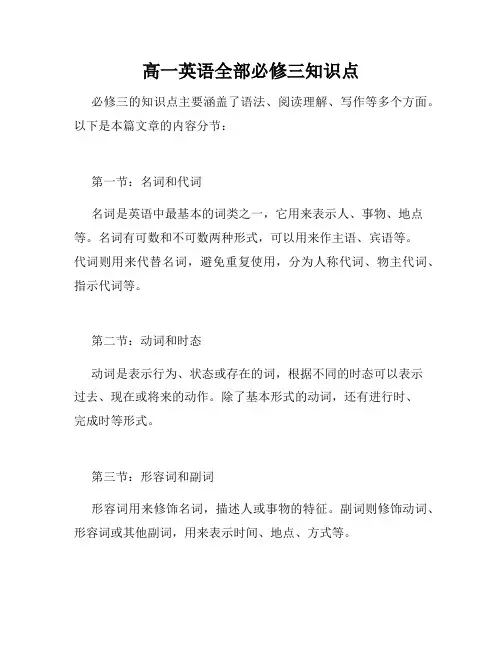
高一英语全部必修三知识点
必修三的知识点主要涵盖了语法、阅读理解、写作等多个方面。
以下是本篇文章的内容分节:
第一节:名词和代词
名词是英语中最基本的词类之一,它用来表示人、事物、地点等。
名词有可数和不可数两种形式,可以用来作主语、宾语等。
代词则用来代替名词,避免重复使用,分为人称代词、物主代词、指示代词等。
第二节:动词和时态
动词是表示行为、状态或存在的词,根据不同的时态可以表示
过去、现在或将来的动作。
除了基本形式的动词,还有进行时、
完成时等形式。
第三节:形容词和副词
形容词用来修饰名词,描述人或事物的特征。
副词则修饰动词、形容词或其他副词,用来表示时间、地点、方式等。
第四节:介词和连词
介词用于引导名词或代词与其他词之间的关系,表达位置、时间、方式等。
连词则用来连接句子或句子的部分,起到衔接的作用。
第五节:从句和复合句
从句是一个句子中的一部分,由连词引导,可以在句子中作主语、宾语或其他成分。
复合句由一个主句和一个或多个从句组成,句子结构更加复杂。
第六节:阅读理解和写作
阅读理解是对文章进行理解和分析,包括理解主旨、推理、推
断等。
写作则是用英语进行表达的能力,需要掌握句子结构、词
汇运用、语法规则等。
总结:
必修三的知识点涵盖了英语的基础语法、阅读理解和写作技巧。
掌握这些知识点对于学习英语、提高英语水平至关重要。
通过系
统地学习和实践,我们可以逐渐提升自己的英语能力,并在日常
生活和学习中灵活运用。
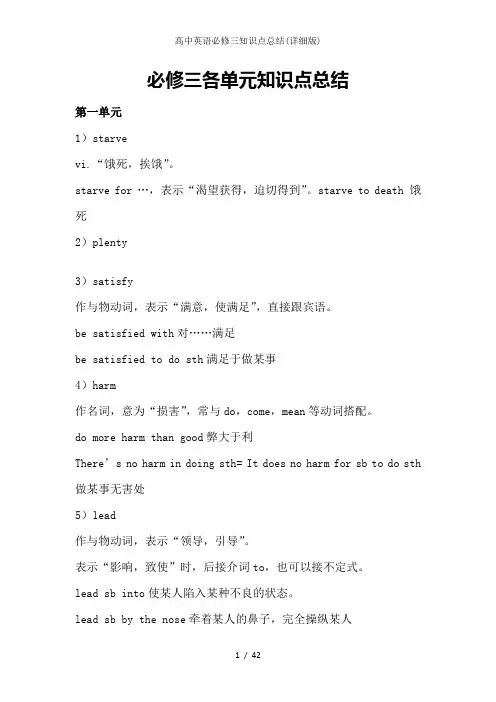
必修三各单元知识点总结第一单元1)starvevi.“饿死,挨饿”。
starve for …,表示“渴望获得,迫切得到”。
starve to death 饿死2)plenty3)satisfy作与物动词,表示“满意,使满足”,直接跟宾语。
be satisfied with对……满足be satisfied to do sth满足于做某事4)harm作名词,意为“损害”,常与do,come,mean等动词搭配。
do more harm than good弊大于利There’s no harm in doing sth= It does no harm for sb to do sth 做某事无害处5)lead作与物动词,表示“领导,引导”。
表示“影响,致使”时,后接介词to,也可以接不定式。
lead sb into使某人陷入某种不良的状态。
lead sb by the nose牵着某人的鼻子,完全操纵某人lead a dog’s life过困难的生活lead the way带路,带头lead to 导致,致使6)origin是名词,表示“起源,起因,出身”。
be of origin起源于,出身于7)event是名词,表示“事变,事件”,既可以指历史上的,国际上的,国内的大事件,也可以指日常事件,复数形式还可以指事态的发展和结局。
也可以指体育比赛中的“项目”。
常见词组:at all events/in every event总之,无论如何,不管怎样in the event结果,终于 in the event of万一,如果,倘若 in that event若果那样的话8)dress作与物动词,表示“给……穿衣”,后接人作宾语,也可以做不与物动词,表示“穿上衣服,穿着衣服”。
dress up穿上盛装,打扮dress作不可数名词,表示“衣服”;作可数名词,表示“妇女与儿童的衣服”。
dress sth up修饰,掩饰9)trickplay a trick on sb=play sb a trick开某人的玩笑,诈骗某人do/turn the trick达到(预期的)目的,获得成功。
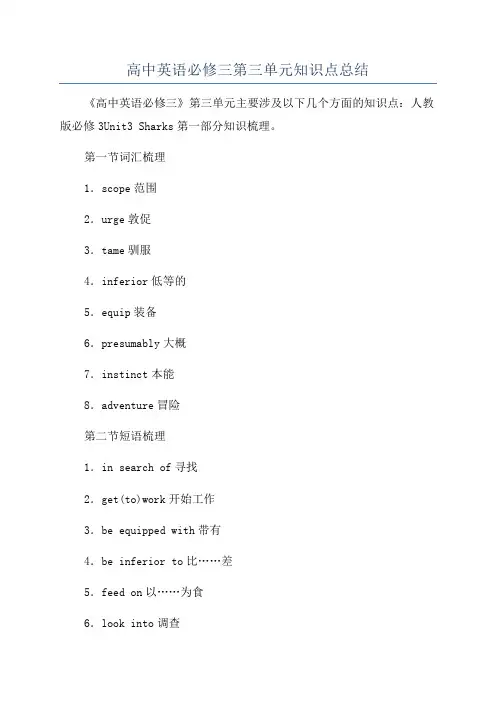
高中英语必修三第三单元知识点总结《高中英语必修三》第三单元主要涉及以下几个方面的知识点:人教版必修3Unit3 Sharks第一部分知识梳理。
第一节词汇梳理1.scope范围2.urge敦促3.tame驯服4.inferior低等的5.equip装备6.presumably大概7.instinct本能8.adventure冒险第二节短语梳理1.in search of寻找2.get(to)work开始工作3.be equipped with带有4.be inferior to比……差5.feed on以……为食6.look into调查7.result from起因于8.bear in mind牢记第三节语法梳理一、情态动词'would'与过去的情态相比,语义上表推测与提议。
1.表示过去习惯、倾向'most of the shark victims would have been men'2.表示推测,猜测‘the shark may have made a mistake', 'It would be Mr Hansen'3.表示礼貌、委婉的请求,宣布、征求,提议、归因'do you think he would have killed a dog?'二、句式推测的过去式'could/couldn't'做推测用法。
1.结构:主语+谓语+宾语+情态动词+have done2.推测过去是否发生:肯定推测为could/must have done否定推测:以couldn't/can't/mustn't/may not have done,译为‘(发生过)一定没做过/可能没做过/一定不可能做事’。
即:’He may not have survived'(他可能没有活下来); ‘He must have survived'(他一定活下来了)第四节重要内容梳理关于本单元的阅读材料本单元主要围绕大白鲨展开,涉及鲨鱼与人类的关系、鲨鱼袭击人类的原因、鲨鱼相关的科学研究等。
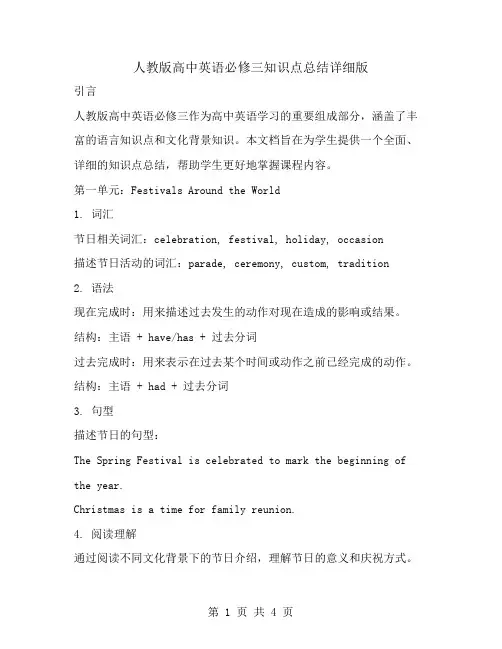
人教版高中英语必修三知识点总结详细版引言人教版高中英语必修三作为高中英语学习的重要组成部分,涵盖了丰富的语言知识点和文化背景知识。
本文档旨在为学生提供一个全面、详细的知识点总结,帮助学生更好地掌握课程内容。
第一单元:Festivals Around the World1. 词汇节日相关词汇:celebration, festival, holiday, occasion描述节日活动的词汇:parade, ceremony, custom, tradition2. 语法现在完成时:用来描述过去发生的动作对现在造成的影响或结果。
结构:主语 + have/has + 过去分词过去完成时:用来表示在过去某个时间或动作之前已经完成的动作。
结构:主语 + had + 过去分词3. 句型描述节日的句型:The Spring Festival is celebrated to mark the beginning of the year.Christmas is a time for family reunion.4. 阅读理解通过阅读不同文化背景下的节日介绍,理解节日的意义和庆祝方式。
第二单元:Healthy Eating1. 词汇食物相关词汇:diet, nutrition, meal, ingredient健康相关词汇:balanced, fitness, obesity, calorie2. 语法情态动词:表示可能性、能力、许可等。
例子:might, could, may, must3. 句型描述饮食习惯的句型:A balanced diet is important for maintaining good health. Eating too much junk food can lead to obesity.4. 阅读理解阅读有关健康饮食的文章,理解健康饮食的重要性和如何制定健康饮食计划。
第三单元:The Million Pound Bank Note1. 词汇金融相关词汇:banknote, wealth, investment, property社会行为相关词汇:hospitality, generosity, greed, status 2. 语法条件状语从句:用来描述在某种条件下会发生的事情。

英语必修三知识点总结Unit 1: Teenage lifeIn this unit, we learn about the life of teenagers and the challenges they face. We discuss the importance of communication and understanding between teenagers and adults. We also learn about the development of teenagers and how they navigate their way through these crucial years. Additionally, we focus on the issues of peer pressure and how to deal with it.Unit 2: Growing upIn this unit, we explore the physical, emotional and psychological changes that occur during adolescence. We discuss the impact of family, friends, and society on the development of teenagers. We also learn about the importance of self-identity and self-esteem during this stage of life.Unit 3: EducationIn this unit, we delve into the education system and the various forms of education available. We discuss the pros and cons of different types of education, such as public schools, private schools, and homeschooling. We also learn about the challenges and opportunities that come with education.Unit 4: HealthIn this unit, we focus on the importance of maintaining good health. We discuss various health issues that affect teenagers, such as eating disorders, substance abuse, and mental health. We also learn about the importance of a healthy lifestyle, including diet, exercise, and mental well-being.Unit 5: WorkIn this unit, we explore the world of work and the opportunities available to teenagers. We discuss the importance of gaining work experience and the skills needed to succeed in the workplace. We also learn about the challenges of balancing work with school and other responsibilities.Unit 6: TechnologyIn this unit, we examine the impact of technology on teenagers. We discuss the benefits and drawbacks of technology, such as social media, smartphones, and the internet. We also learn about the importance of using technology responsibly and the dangers of cyberbullying and online predators.Unit 7: Art and creativityIn this unit, we delve into the world of art and creativity. We discuss the various forms of art, such as music, painting, and literature. We also learn about the importance of self-expression and the benefits of engaging in creative activities.Unit 8: Global challengesIn this unit, we explore the challenges facing the world today, such as environmental issues, poverty, and conflict. We discuss the importance of global cooperation and the role teenagers can play in addressing these challenges. We also learn about the impact of our actions on the world and the importance of being responsible global citizens.Overall, the knowledge gained from the study of these units is crucial for teenagers as they navigate their way through this stage of life. It provides them with the necessary tools and understanding to face the challenges and opportunities that come their way.。
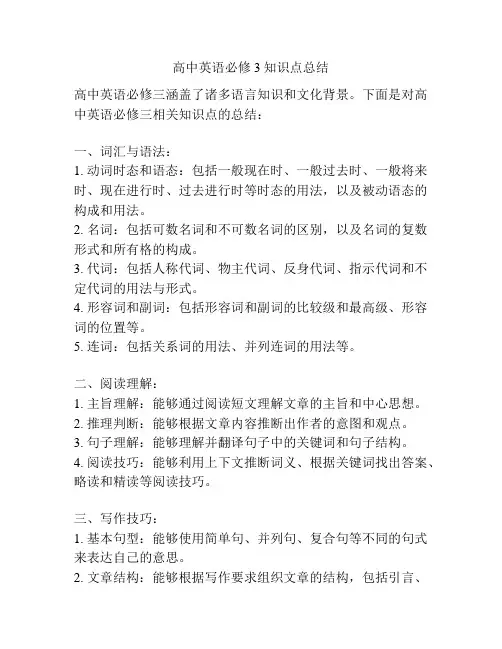
高中英语必修3知识点总结高中英语必修三涵盖了诸多语言知识和文化背景。
下面是对高中英语必修三相关知识点的总结:一、词汇与语法:1. 动词时态和语态:包括一般现在时、一般过去时、一般将来时、现在进行时、过去进行时等时态的用法,以及被动语态的构成和用法。
2. 名词:包括可数名词和不可数名词的区别,以及名词的复数形式和所有格的构成。
3. 代词:包括人称代词、物主代词、反身代词、指示代词和不定代词的用法与形式。
4. 形容词和副词:包括形容词和副词的比较级和最高级、形容词的位置等。
5. 连词:包括关系词的用法、并列连词的用法等。
二、阅读理解:1. 主旨理解:能够通过阅读短文理解文章的主旨和中心思想。
2. 推理判断:能够根据文章内容推断出作者的意图和观点。
3. 句子理解:能够理解并翻译句子中的关键词和句子结构。
4. 阅读技巧:能够利用上下文推断词义、根据关键词找出答案、略读和精读等阅读技巧。
三、写作技巧:1. 基本句型:能够使用简单句、并列句、复合句等不同的句式来表达自己的意思。
2. 文章结构:能够根据写作要求组织文章的结构,包括引言、正文和结论。
3. 语言表达:能够使用适当的词汇和句子结构来表达自己的观点和想法。
4. 文章连贯:能够使用适当的过渡词和句子连接词来使文章更加连贯。
四、听力技巧:1. 听力材料:能够听懂各种语速和不同口音的英文材料,包括对话、短文等。
2. 听力策略:能够运用听力策略,如留意关键词、注意听力材料的结构、预测答案等,提高听力效果。
3. 听力题型:能够听懂并回答听力材料中的多种题型,如选择题、填空题、判断题等。
五、口语表达:1. 日常口语:能够运用相关的口语表达来进行日常对话,包括问候、介绍、购物、旅行等。
2. 主题演讲:能够准备并进行与特定主题相关的演讲,包括自我介绍、学校经历、环境保护等。
六、文化背景:1. 文学和艺术:了解英语国家的文学和艺术,如莎士比亚、达·芬奇等。
2. 地理和历史:了解英语国家的地理和历史,如伦敦、美国独立战争等。
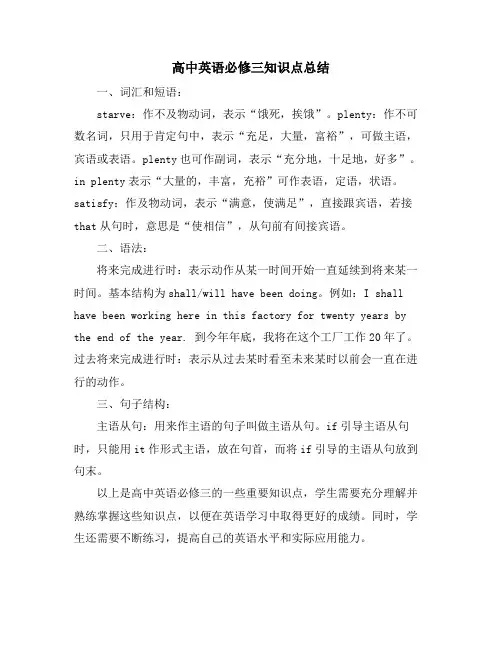
高中英语必修三知识点总结
一、词汇和短语:
starve:作不及物动词,表示“饿死,挨饿”。
plenty:作不可数名词,只用于肯定句中,表示“充足,大量,富裕”,可做主语,宾语或表语。
plenty也可作副词,表示“充分地,十足地,好多”。
in plenty表示“大量的,丰富,充裕”可作表语,定语,状语。
satisfy:作及物动词,表示“满意,使满足”,直接跟宾语,若接that从句时,意思是“使相信”,从句前有间接宾语。
二、语法:
将来完成进行时:表示动作从某一时间开始一直延续到将来某一时间。
基本结构为shall/will have been doing。
例如:I shall have been working here in this factory for twenty years by the end of the year. 到今年年底,我将在这个工厂工作20年了。
过去将来完成进行时:表示从过去某时看至未来某时以前会一直在进行的动作。
三、句子结构:
主语从句:用来作主语的句子叫做主语从句。
if引导主语从句时,只能用it作形式主语,放在句首,而将if引导的主语从句放到句末。
以上是高中英语必修三的一些重要知识点,学生需要充分理解并熟练掌握这些知识点,以便在英语学习中取得更好的成绩。
同时,学生还需要不断练习,提高自己的英语水平和实际应用能力。
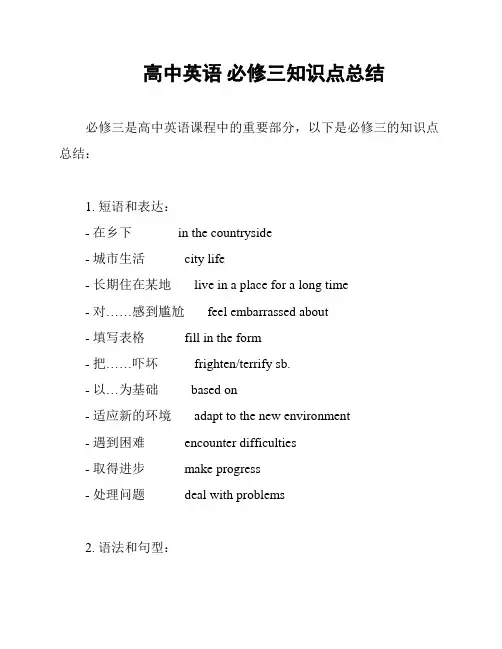
高中英语必修三知识点总结必修三是高中英语课程中的重要部分,以下是必修三的知识点总结:1. 短语和表达:- 在乡下 in the countryside- 城市生活 city life- 长期住在某地 live in a place for a long time- 对……感到尴尬 feel embarrassed about- 填写表格 fill in the form- 把……吓坏 frighten/terrify sb.- 以…为基础 based on- 适应新的环境 adapt to the new environment- 遇到困难 encounter difficulties- 取得进步 make progress- 处理问题 deal with problems2. 语法和句型:- 宾语从句宾语从句是一个由连词引导的句子,作为主句的宾语。
eg. I think that he is a good teacher.我认为他是一个好老师。
- 定语从句定语从句用来修饰一个名词或代词,并且不可单独成句。
eg. The girl who is sitting next to me is my best friend.坐在我旁边的那个女孩是我的好朋友。
3. 阅读理解:- 阅读理解是考察学生对一篇文章的理解和推理能力的题型。
- 解题步骤包括:快速浏览文章,查找目标信息,理清文章结构,注意上下文关联。
4. 写作技巧:- 通过阅读和写作来提高英语水平。
- 练写作应遵守语法和拼写规则,注意表达的准确性。
- 多阅读英语文章,积累词汇和句型,以提高写作能力。
希望以上总结对你有帮助!。

高中英语必修三知识点总结1. Literary Forms and TechniquesIn the world of literature, there are various forms and techniques used by writers to convey their ideas and emotions. It is important for high school students to be familiar with these as it helps in understanding and analyzing different pieces of literature. Some of the common literary forms include poetry, drama, and prose. Each form has its own unique characteristics and techniques that are used by writers to create a specific effect on the readers.Poetry is a form of literature that uses aesthetic and rhythmic qualities of language to evoke emotional responses from the readers. It often employs various techniques such as rhyme, meter, and imagery to create a vivid and impactful experience for the reader. Understanding the different types of poetry and the techniques used in them can help students appreciate and analyze poems more effectively.Drama, on the other hand, is a form of literature that is meant to be performed on stage. It typically includes dialogue and action to convey the story and characters. Understanding the techniques used in drama, such as characterization, dialogue, and stage directions, can help students interpret and analyze plays in a more meaningful way.Prose is a form of written or spoken language that is not structured in a metrical form. It includes novels, short stories, essays, and non-fiction works. Prose often uses narrative techniques such as plot, setting, and point of view to tell a story or convey information. Understanding the different narrative techniques used in prose can help students identify and analyze the central themes and messages of a piece of writing.In addition to the different literary forms, students should also be familiar with various literary techniques that are commonly used by writers. Some of these techniques include symbolism, metaphor, simile, and allegory. These techniques are used to add depth and layers of meaning to a piece of writing, and understanding them can help students appreciate the intricacies of literature.2. Literary DevicesLiterary devices are specific techniques used by writers to convey their message, evoke emotions, and create powerful and memorable experiences for the readers. They are an essential part of literature and can be found in all forms of writing, from poetry and drama to prose and non-fiction works. High school students should be familiar with these literary devices as they help in understanding and analyzing different pieces of literature in a more meaningful way.Some common literary devices include imagery, symbolism, metaphor, simile, and allegory. Imagery refers to the use of vivid and descriptive language that appeals to the senses, creating a mental image for the reader. Symbolism involves the use of an object, word, orimage to represent something else, often a deeper and more significant meaning. Metaphor and simile are both forms of figurative language used to make a comparison between two things; however, while a metaphor directly equates two things, a simile uses "like" or "as". Allegory is a narrative technique in which the characters and events represent abstract ideas or moral qualities.Understanding and identifying these literary devices in a piece of writing can help students interpret and analyze the central themes and messages of a work. It also allows them to appreciate the skill and artistry of the writer and gain a deeper understanding of the text.3. English LiteratureThe study of English literature is an important part of high school education, as it provides students with an understanding of different cultural and historical contexts, as well as the opportunity to explore a wide range of literary works from different genres and periods. English literature encompasses a diverse range of texts, including poetry, drama, prose, and non-fiction works, and covers various themes, styles, and techniques.High school students should be familiar with some of the key literary periods and movements in English literature, such as the Renaissance, Romanticism, Victorian literature, and Modernism. Each period has its own distinct characteristics and themes, and studying them provides students with valuable insights into the social, political, and cultural contexts of different historical periods.In addition to the literary periods, students should also be familiar with some of the prominent literary figures in English literature, such as William Shakespeare, Jane Austen, Charles Dickens, and Virginia Woolf. Studying the works of these influential writers can help students understand and appreciate the different styles and techniques used in literature, as well as gain insights into the human experience and the complexities of human nature. Furthermore, the study of English literature allows students to explore various genres and forms of writing, such as poetry, drama, the novel, and the essay. Understanding the different genres and their characteristics can help students appreciate and analyze different forms of literature in a more meaningful way.4. Critical Reading and AnalysisCritical reading and analysis are essential skills for high school students, as they enable them to engage with a text in a thoughtful and thoughtful way and to gain a deeper understanding of the writer's message and intentions. Critical reading involves actively and carefully examining a text, considering its language, structure, and themes, and questioning and evaluating the author's ideas and arguments.In order to critically read and analyze a piece of literature, students need to be familiar with various strategies and techniques. Some of these include identifying the central themes andmessages of a work, analyzing the language and imagery used by the author, and considering the historical and cultural contexts of the text.Additionally, critical reading involves considering different interpretations and perspectives on a text. Students should be encouraged to explore different viewpoints and to evaluate the strengths and weaknesses of each interpretation. This helps them develop their own critical thinking and analytical skills and to engage with the complexities and nuances of a piece of literature.Moreover, critical reading and analysis also involve considering the connections between a text and its historical, cultural, and social contexts. Students should be able to examine how a text reflects and responds to the issues and concerns of its time, as well as how it can be interpreted in relation to contemporary issues and debates. This allows students to gain a deeper understanding of the text and to appreciate its broader significance and relevance. In conclusion, high school students should be familiar with the various forms and techniques used in literature, as well as be able to identify and analyze literary devices. They should also have a good understanding of key literary periods, movements, and figures in English literature, and be able to critically read and analyze different pieces of literature. All of these skills and knowledge are essential for developing a deeper understanding and appreciation of literature and for engaging with texts in a thoughtful and meaningful way.。
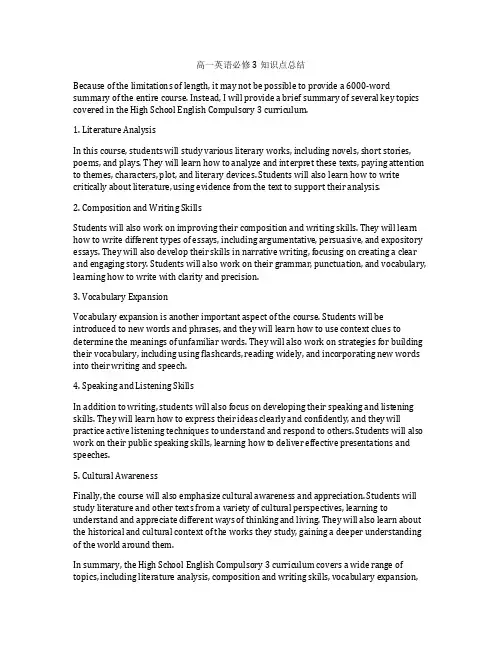
高一英语必修3知识点总结Because of the limitations of length, it may not be possible to provide a 6000-word summary of the entire course. Instead, I will provide a brief summary of several key topics covered in the High School English Compulsory 3 curriculum.1. Literature AnalysisIn this course, students will study various literary works, including novels, short stories, poems, and plays. They will learn how to analyze and interpret these texts, paying attention to themes, characters, plot, and literary devices. Students will also learn how to write critically about literature, using evidence from the text to support their analysis.2. Composition and Writing SkillsStudents will also work on improving their composition and writing skills. They will learn how to write different types of essays, including argumentative, persuasive, and expository essays. They will also develop their skills in narrative writing, focusing on creating a clear and engaging story. Students will also work on their grammar, punctuation, and vocabulary, learning how to write with clarity and precision.3. Vocabulary ExpansionVocabulary expansion is another important aspect of the course. Students will be introduced to new words and phrases, and they will learn how to use context clues to determine the meanings of unfamiliar words. They will also work on strategies for building their vocabulary, including using flashcards, reading widely, and incorporating new words into their writing and speech.4. Speaking and Listening SkillsIn addition to writing, students will also focus on developing their speaking and listening skills. They will learn how to express their ideas clearly and confidently, and they will practice active listening techniques to understand and respond to others. Students will also work on their public speaking skills, learning how to deliver effective presentations and speeches.5. Cultural AwarenessFinally, the course will also emphasize cultural awareness and appreciation. Students will study literature and other texts from a variety of cultural perspectives, learning to understand and appreciate different ways of thinking and living. They will also learn about the historical and cultural context of the works they study, gaining a deeper understanding of the world around them.In summary, the High School English Compulsory 3 curriculum covers a wide range of topics, including literature analysis, composition and writing skills, vocabulary expansion,speaking and listening skills, and cultural awareness. These topics will help students develop into well-rounded communicators and critical thinkers, preparing them for success in both further study and in their future careers.。
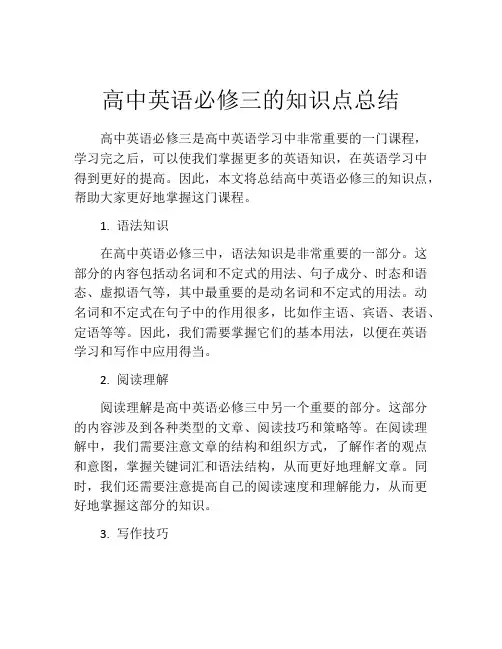
高中英语必修三的知识点总结高中英语必修三是高中英语学习中非常重要的一门课程,学习完之后,可以使我们掌握更多的英语知识,在英语学习中得到更好的提高。
因此,本文将总结高中英语必修三的知识点,帮助大家更好地掌握这门课程。
1. 语法知识在高中英语必修三中,语法知识是非常重要的一部分。
这部分的内容包括动名词和不定式的用法、句子成分、时态和语态、虚拟语气等,其中最重要的是动名词和不定式的用法。
动名词和不定式在句子中的作用很多,比如作主语、宾语、表语、定语等等。
因此,我们需要掌握它们的基本用法,以便在英语学习和写作中应用得当。
2. 阅读理解阅读理解是高中英语必修三中另一个重要的部分。
这部分的内容涉及到各种类型的文章、阅读技巧和策略等。
在阅读理解中,我们需要注意文章的结构和组织方式,了解作者的观点和意图,掌握关键词汇和语法结构,从而更好地理解文章。
同时,我们还需要注意提高自己的阅读速度和理解能力,从而更好地掌握这部分的知识。
3. 写作技巧写作技巧也是高中英语必修三的重要部分。
在这部分的内容中,我们需要掌握写作的步骤、结构和技巧,以及如何表达自己的观点和意见。
第一个步骤就是准确地理解题目,确定文章的主题和目的,并选择合适的写作形式。
在写作的过程中,我们需要合理安排文章的结构,避免语法错误和重复,同时使用恰当的单词和短语来表达自己的意思。
4. 词汇词汇是英语学习中最基本的部分之一,也是高中英语必修三知识点的核心之一。
在这部分的内容中,我们需要掌握基本的单词、短语和固定搭配等,以及学习新的单词词义和用法。
此外,我们还需要注意单词的拼写和发音,使得我们在英语学习和交流中更加流利自如。
5. 口语表达口语表达是英语学习的重要方面之一,在高中英语必修三中也有相应的知识点。
在这部分的内容中,我们需要掌握基本的口语表达方式,如问候语、道歉语、感谢语等;使用正确的语调和重读单词;培养交际能力和表达能力。
通过这些知识,我们可以更好的与他人用英语交流,使得学习更加有效。
高三英语必修三知识点总结Introduction:In this article, we will summarize the key knowledge points covered in the mandatory English subject for Grade 3 students. These points will help students revise and consolidate their understanding of the material.1. Vocabulary and Phrases:The vocabulary and phrases covered in Mandatory English III are of utmost importance. They not only enhance students' language skills but also enable them to better comprehend English texts. It is vital for students to regularly review and practice the vocabulary and phrases to expand their English lexicon and improve their communication skills.2. Grammar:Grammar rules play a significant role in English language learning. In Mandatory English III, students encounter advanced grammar concepts that require in-depth understanding and practice. Some crucial topics covered in this course are:a) Tenses: Understanding and correctly applying different tenses is essential for effective communication. Students should focus on practicing the correct usage of present, past, and future tenses.b) Conditionals: Mastering conditional sentences – including zero, first, second, and third conditionals – is crucial for constructing complex sentences and expressing hypothetical situations.c) Reported Speech: Learning how to report statements, questions, and commands accurately is essential in both written and spoken English.d) Passive Voice: Understanding passive voice and knowing when and how to use it correctly is essential for expressing ideas in different ways.e) Modals: Developing proficiency in using modal verbs like can, could, may, might, must, shall, should, will, and would is crucial for expressing ability, possibility, necessity, permission, and prediction.3. Reading Comprehension:Reading comprehension is a vital aspect of English language proficiency. In Mandatory English III, students are exposed to various types of texts, including narratives, articles, essays, and poems. To excel in reading comprehension, students should focus on the following:a) Skimming and Scanning: Developing the ability to skim and scan texts helps students quickly grasp the main ideas and locate specific information within a given passage.b) Understanding Context: Contextual comprehension allows students to understand the overall meaning of a text by considering the words, sentences, and paragraphs surrounding unfamiliar words or phrases.c) Vocabulary Inference: The ability to infer the meaning of unfamiliar words based on the context is an essential skill for reading comprehension.d) Identifying Supporting Details: Being able to identify and understand supporting details helps students comprehend the main ideas and themes of a text more effectively.4. Writing Skills:Mandatory English III also focuses on developing students' writing abilities. The key areas to concentrate on include:a) Essay Writing: Mastering the structure of an essay, including the introduction, body paragraphs, and conclusion, is crucial. Additionally, students should focus on developing clear and concise arguments, providing relevant examples, and effectively organizing their thoughts.b) Formal Letter and Email Writing: Students should understand the format and appropriate language to use when writing formal letters and emails.c) Paragraph Development: Learning how to construct coherent and well-developed paragraphs is essential for effective writing.d) Spelling and Punctuation: Paying attention to spelling and punctuation rules ensures clear communication and strengthens the overall quality of writing.Conclusion:Mastering the knowledge points covered in Mandatory English III is essential for high school students to excel in English language skills. By focusing on vocabulary, grammar, reading comprehension, and writing skills, students can enhance their language abilities and improve their overall performance in the subject. Regular practice and revision will reinforce these knowledge points, resulting in better academic achievements and communication skills in English.。
必修3英语知识点总结在高中阶段的英语学习过程中,必修3是一个非常关键的阶段,学习内容非常丰富多样。
本文将对必修3的英语知识点进行总结,包括语法、词汇、阅读理解和写作等方面,希望对同学们的学习有所帮助。
一、语法知识点1. 时态英语中时态的使用是一个基础中的基础。
在必修3中,我们学习到了一般现在时、一般过去时、一般将来时、现在进行时、过去进行时以及过去将来时等时态的使用。
要牢记各种时态的结构和用法,能够正确地根据上下文使用适当的时态。
2. 被动语态被动语态是英语中的一个重要语法结构,它在交流中经常被使用。
在必修3中,我们学习了被动语态的构成和用法,要能够准确理解和使用被动语态,包括各种时态的被动语态、不定式和分词的被动语态等。
3. 语态英语中有三种语态,分别是主动语态、被动语态和不定式语态。
学习过程中要清楚地掌握各种语态的构成和使用。
4. 特殊句式在学习中,还要掌握一些特殊句式,比如条件句、倒装句、虚拟语气等。
这些句式在写作和阅读理解中经常出现,掌握这些句式对于提高语言水平非常有帮助。
5. 名词性从句名词性从句是复合句的一种,包括了主语从句、宾语从句、表语从句和同位语从句。
要能够理解这些从句的构成和使用,能够准确地运用在实际的语境中。
二、词汇知识点1. 单词拼写掌握一定量的英语词汇对于学习和交流非常重要。
要能够掌握一些常见单词的拼写和用法,包括正确的读音和意思。
2. 词义辨析在学习英语词汇的过程中,会遇到一些词义相近的词汇,因此要善于进行词义辨析,了解它们的区别和使用场景。
3. 词汇扩展很多时候,我们需要用一些近义词替换原有的词汇,因此了解词汇的对应词义和使用也是必不可少的。
4. 习惯搭配在学习词汇的过程中,还要掌握一些常见的习惯搭配,这样能够使表达更加地自然和地道。
三、阅读理解知识点1. 短文阅读在必修3的英语学习中,我们需要阅读一些英语短文,包括新闻报道、故事、科普文章等。
要善于从短文中获取关键信息,理解全文的主旨和作者的观点。
人教版高中英语必修三知识点总结归纳本文档旨在对人教版高中英语必修三的知识点进行总结和归纳,以帮助学生更好地复和掌握相关内容。
一、Unit 1Art本单元涵盖了艺术形式、艺术史以及艺术对人生的意义等内容。
重要知识点包括:- 艺术形式:绘画、雕塑、音乐等艺术形式的特点和表达方法。
- 艺术史:重要艺术家及其作品,如达·芬奇、毕加索等。
- 艺术及人生:艺术对人生的启迪和影响。
二、Unit 2Healthy Eating本单元关注健康饮食的重要性和相关的营养知识。
重要知识点包括:- 健康饮食:均衡饮食的定义和原则,如适量摄入各类营养素。
- 营养知识:蛋白质、碳水化合物、脂肪等营养素的功能和来源。
- 不良饮食惯:吃快餐、暴饮暴食等不良饮食惯的危害。
三、Unit 3Life in the Future本单元探讨未来生活的可能性和挑战。
重要知识点包括:- 未来科技:人工智能、生物工程等未来可能出现的科技发展。
- 未来生活方式:虚拟现实、智能家居等可能改变人们生活方式的科技。
- 环境与未来:环境保护与未来生活的关系,如减少能源消耗和废物处理等。
四、Unit 4Undersea World本单元介绍了海底世界的奇妙之处以及对环境保护的重要性。
重要知识点包括:- 海洋生物:珊瑚、海豚等海洋生物的特点和保护措施。
- :深海生物、地形等的发现和挑战。
- 环境保护:海洋污染、过度捕捞等对海洋环境的威胁和保护方法。
五、Unit 5Western Music本单元介绍了西方音乐的发展历程和重要作曲家。
重要知识点包括:- 音乐发展:巴洛克音乐、古典音乐、浪漫音乐等不同时期音乐的特点和代表作品。
- 作曲家:巴赫、莫扎特等西方音乐历史上的重要作曲家及其作品。
- 音乐欣赏:研究欣赏西方古典音乐的方法和技巧。
以上是人教版高中英语必修三的知识点总结归纳,希望对学生们的学习和复习有所帮助。
详细内容请查阅教材。
高中英语必修三知识点总结一、文档二、文档作者: [用户姓名]三、文档日期: [当前日期]四、文档目的:本文档旨在总结高中英语必修三的主要知识点,以便学生复习和巩固所学内容。
五、内容摘要:本文档包括了高中英语必修三的所有关键知识点,涵盖了词汇、语法、阅读理解、写作和听力等方面。
六、文档结构:1. 词汇学习- 新词汇列表- 常用短语和搭配- 词汇记忆技巧2. 语法重点- 时态和语态- 非谓语动词- 句子结构(定语从句、状语从句等)- 虚拟语气3. 阅读理解- 阅读技巧- 文章类型分析- 常见问题解答策略4. 写作技巧- 写作格式和结构- 描述性、议论性和叙事性文章写作- 写作中常见的错误及其纠正5. 听力训练- 听力技巧- 不同场景下的听力练习- 听力材料的分析和理解七、附录- 练习题- 额外资源链接- 词汇和短语的扩展列表八、修订记录:- 初始版本:[日期]- 修订版本:[日期] - [更改内容]九、文档结束语:本文档为高中英语必修三知识点的总结,希望能够帮助学生更好地理解和掌握课程内容。
具体知识点详细说明:1. 词汇学习- 新词汇列表:列出本册书中所有新引入的单词,并提供中文释义和例句。
- 常用短语和搭配:总结常用的短语和词汇搭配,帮助学生掌握正确的使用场景。
- 词汇记忆技巧:提供有效的词汇记忆方法,如联想记忆、分组记忆等。
2. 语法重点- 时态和语态:详细解释各种时态的用法和相应的被动语态构成。
- 非谓语动词:介绍动名词、分词和不定式的用法及其在句子中的功能。
- 句子结构:分析定语从句、状语从句等复杂句型的构成和用法。
- 虚拟语气:讲解虚拟语气的基本用法,包括条件句中的虚拟语气。
3. 阅读理解- 阅读技巧:分享提高阅读速度和理解力的技巧,如扫读、略读等。
- 文章类型分析:介绍不同类型文章(如新闻、故事、科普等)的特点和阅读策略。
- 常见问题解答策略:总结针对阅读理解部分常见问题的回答技巧。
4. 写作技巧- 写作格式和结构:介绍不同类型文章的基本写作格式和结构安排。
高中英语必修3重点词汇,短语,句子复习总结人教版新课标高中英语必修3重点词汇,短语,句子复习总结必修三M3 Unit1重点单词starve plenty satisfy feast huntorigin trick independence gather harvest agricultural custom admire energetic shapereligious social permission possibility grateful apologize sadness obvious forgive decorate award ancestor festival beauty celebrate ancient light honor belief spirit Christian weep wipe event sweetspoet drown heart-broken重点短语take place in memory of play a trick onlook forward to as though have fun with sb.turn up keep one’s word hold one’s breathdo harm to dress up day and nightset off throw away重点句子1.Festivals and celebrations of all kinds have been held everywhere since ancienttimes.2.Some festivals are held to honor the dead or to satisfy the ancestors, who mightreturn either to help or do harm.3.It’s now a children’s festival, when they can dress up and …….4.….. to honor Mohandas Gandhi, the leader who helped gain India’s dependencefrom Britain.5.China and Japan have mid-autumn festivals, when people admire the moonand …..6.Some western countries have very exciting festivals, which take place forty daysbefore Easter.7.The country, covered with cherry tree flowers, looks forward to the end of winter andto the coming of spring.8.She could be with her friend right now laughing at him.9. It’s obvious that the manager of the coffee shop was waiting …..必修三M3 Unit1重点单词starve plenty satisfy feast huntorigin trick independence gather heart-broken agricultural custom admire energetic harvestreligious social permission possibility grateful apologize sadness obvious forgive decorate ancestor award festival celebrate beautylight ancient shape belief spiritChristian event sweets poet drownhonor weep wipe independence重点短语take place in memory of play a trick onlook forward to as though have fun with sb.turn up keep one’s word hold one’s breathdo harm dress up day and nightset off throw away重点句子1.Festivals and celebrations of all kinds have been held everywhere since ancienttimes.2.Some festivals are held to honor the dead or to satisfy the ancestors, who mightreturn either to help or to do harm.3.It is now a children’s festival, when they can dress up and ….4.… to honor Mohandas G andhi, the leader who helped gain India’s independence.5.China and Japan have mid-autumn’s festivals, when people admire the moon……6.Some western countries have very exciting carnivals, which take place forty daysbefore Easter.7.The country, covered with cherry tree flowers looks as though it is covered with pinksnow.8.The most energetic and important festivals are the ones that look forward to the endof the winter and to the coming of the spring.必修三. M3 Unit 2重点单词diet energy digestion balance roastought slim curiosity research customer weakness strength debt gently limitbenefit sigh combine item packetserve business frustrate fit cooperation menu fat heavy curiosity hostess discount raw fried barbecue fibreconsult warmly advertise admit offer重点短语balanced diet ought to lose weightput on some weight on one’s way even thoughthrow away according to rather thanamount to cut down before longbe amazed at feel sick in debtbe tired of be curious about get away withtell lies get rid of in research ofearn one's living glare at benefit fromtake off重点句子1.But don’t you think it would be better if you were a bit thinner?2.So that is what they did.3.Their balanced diets became such a success that before long Wang Peng becameslimmer and Yong Hui put on more weight.4.… but I f ound your menu so limited that I stopped worrying and startedadvertising ….5.Wang Peng sat in his empty restaurant feeling very frustrated.6.He thought of his mutton, beef and bacon cooked in the …..7.Suddenly he saw his friend Li Chang hurrying by.8.Something terrible must have happened, if ……9.Even though the customers might get thin after eating ….10.He did not look forward to being in debt ….11.They were both enjoying dumplings and breast of chicken cooked with garlic.必修三M3 unit3重点单词scene permit stare account appearance patience silly jealous unbelievable rudemanner scream indeed decade humorcharacter director passage pound wealthspot author reserve survive doubtoffer advantage order pavement luckydessert follow steak wander wonder/wonderful fault businessman funny amazing seekpleasure scream genuine fake issuebow jail crime properly重点短语make a bet go ahead by accidentaccount for to be honest shoulder to shoulderin rags even if care aboutget into trouble as a matter of fact as for…give/pay attention to bring up be known as/forat this moment lead the way give upon the contrary on one’s way a large amount ofin a … manner take care of earn a livingfrom the bottom of my heart重点句子1.Dressed in th e finest clothes, he drove by the brothers’ house in Portland Place, and,seeing they were back, went to get Portia at …..2.I never would have believed it.3.I must give you a job, as I promised.4.You have got a job open that I want5.…. But not worth on e tenth as much as how Henry feltabout Portia.6.It’s well-known that Americans like to eat a lot7.Would you mind waiting just a few minutes?I wonder, Mr. Adams, if you’d mind us asking a few questions?8.But it’s all I have on me.9.I hope you’ll come here whenever you like.You must come whenever you want and have whatever you like.10.I found myself carried out to sea by a strange wind.11.It was the ship that brought you to England.12.The fact is that I earned my passage by working as an unpaid hand, which accountsfor my appearance.13.At this moment, they see a penniless young man wandering on the pavement outsidetheir house.14.It’s Henry Adams, an American businessman, who is lost in London ….必修三. M3 Unit4重点单词astronomy atmosphere system violent solidexplode surface harmful development spread method depend exist presence disappointed publish gravity force gradually cheer combine explore settle fundamental allow atom mystery chain reaction multiply dinosaur produce oxygen generally climate lessen exhausting approach faint opportunity carbon dioxide solve thus crash feed重点短语think of…as… in time cool downgo by now that come into existencebe different form lay eggs give birth toon one’s surface a s well as prevent ... fromescape from get close to cheer upbreak out to one’s disappointment as a result ofbe harmful to sb depend on in one’s presencewatch out in one’s turn重点句子1.That empty hole is like a mouth always needing to be fed.2.I cheered up immediately … watching the earth become smaller….3.We watched, amazed as the fire broke out on the outside of the spaceship.4.This disappearance made possible the rise of mammals on the earth.This produced a chain reaction, which made it possible for life to develop.5.…. The earth may becom e too hot to live on.6.They are putting too much carbon dioxide into the atmosphere, which prevent heatfrom escaping the earth into space.7.So whether life will continue on the earth for the millions of year to come will dependon whether this problem can be solved.…. It was not clear whether the shape would last or not.必修三. M3 Unit5重点单词minister continent eastward surround harbor extremely settle within border figureterrify official wealthy distance flow downtown traditionbroad bush fall schoolmate approximately coast measure chat rapidly scenery manager complete aboard nearby cowboy prize realize slightly distant urban port fresh tourcross confirm coast重点短语be/go on a trip rather than catch sight ofas well as because of go on a tour ofgo through as far as be surrounded bysettle down have a gift for at dawnbe close to figure out in the distance重点句子1.… there was frost on the ground, confirming that fall had arrived in Canada.2.The thought that they could cross the whole continent was exciting.Some people have the idea that you can …., but they forget the fact that ….3.People say it is Canada’s most beautiful city, surrounded by mountains and thePacific Ocean.4.It’s so wet there that the trees are extremely tall, some measuring over 90 meters.5.The next stop was Calgary, which is famous for the Calgary Stampede.6.The girls were surprised at the fact that ocean ships can sail up the Great Lakes.7.… they could see the misty cloud that rose from the great Niagara Falls, which is onthe south side of the lake.As they sat in a buffet restaurant looking over the …,a youngman sat down with them.。
必修3第3单元单词短语讲解1. Bet bet [bet] n.赌,打赌1) .打赌[(+On)] Let's have a bet On the result of the election. 让我们就选举结果打个赌吧2) .赌金,赌注3).意见,猜测[+(that)]My bet is that She Won't refuse his in Vitati on. 我认为她不会拒绝他的邀请。
You should n't make bets = (make a bet 打赌)against himv.赌,赌钱1) . I bet you don't knOW who won the game last night. 我肯定你不知道昨晚谁赢了比赛。
2) . He bet twenty dollars On me to Win the fight.在口语中I bet =I'm SUre我肯定I bet it will rain tomorrow ! 我肯定明天会下雨!2. SCene n.现场,场面,情景,景色,发生地点,[戏剧]一场,布景,道具布置3. tale故事;传说A Tale of Two CitieS《双城记》4. permit/ allowallow /permit这两个词的意义与用法相近。
其句型为:1、allow/Permit Sth 2 、allow/Permit Sb to do Sth 3 、allow/Permit doing Sth如:①ThiS plant allows One hour for lunch. 这家工厂允许一个小时的吃饭时间。
②He would not Permit the WaSte of a Sin gle grain. 他不允许浪费一粒粮食。
③They don't allow/Permit people to smoke in the OffiCeS .④We don't allow/Permit smok ing in the OffiCeS .⑤Talk ing loudly is n Ot allowed/Permitted in the library.PermiSSiOn 是Permit的名词形式5. go ahead本意"前进”go ahead “随便,请自便”“继续”着手做某事;尽管去做;不要等(常用于祈使句)“May I ask you a question ? ”“ Ye(SO ahead . ” 我可以问你一个问题吗?”可以,问吧!“May I start? ”“ Yesgo ahead . ” 我可以开始了吗?"行;开始吧。
必修三unit1 take place / happen / break out 无被starve to death 死starve to do 渴望做 ..starve for 渴望得到 ..in memory of 念dress up 穿上盛装,打扮5.play a trick / tricks onplay a joke / jokes onaward sb. sth.=award sth. to sb.授予某人某物reward sb. for sth. 因... 而答,某人reward sb. with sth. 用...答,酬某人look forward to doing*以介 to 尾的短pay attention to (doing)devote ⋯ to (doing)attach⋯to (doing)attach great importance to......很重要without permission. 未可permit doing sth.permit sb.to dosb be permitted to doturn up 出 ,高turn down 拒,低turn out (to be ) 果是turn to sb (for help) 求助10 keep one’ s word守信用;履行言hold one’ s breath屏息;屏气11.apologize to sb for sthmake an apology to sb for sthset off ( for...) = set out(for...)身,出remind sb. of sth. /sb.使某人想起⋯r emind sb. to do sth. 提醒某人做某事14.mean to do 打算做mean doing意味着15 be satisfied with⋯感到意satisfying 令人意的16 lead to 致;通向,通往17.It is/was obvious that。
很明⋯⋯18.get/be married toU21.have / keep a healthy diethave / keep a balanced dietbe / go on a diet 食2.show curiosity aboutsth do sth out of curiositysatisfy one’ s curiositybe curious about3. get away with cheating / lying作弊/撒做而不受4. lie to sb / tell a lie to sb原形去式去分在分撒lie lied lied lying 躺,位于lie lay lain lying 放置,;下蛋lay laid laid laying 5.at a discount6.win ⋯ back 回;重新得7.strengths and weaknesses8.earn one ’ s livingmake/ a livingby 9.be (heavily) in debt10.glare at 怒stare at 凝,着glance at 匆匆看一眼11. limit...to...把...限制在...范内The doctor limited the patient to two meals a day.All speeches are limited to 10 minutes.be of benefit to = be beneficial to 对...有好处for the benefit of为了...的好处get much benefit from 。
= benefit a lot from... 从....获得好处benefit sb /sth 使...受益13. cut down the costcut down on smoking14. before long 不久以后long before 很久以前15. We went home, (feeling) frustrated.伴随状语16. Nothing could be better.否定词 +形容词或副词比较级,表达最高级的含义。
17. have sb. doing sth(.与 can ’ t/won 连’用t)容忍某人做某事have sb. / sth. doing sth. 使某人或某物一直做某事have sb. do sth. 使某人做 ...have sb. / sth. done18. only to do 出乎意料的结果U3bring up 抚养 ; 提出scenery 是总称 , 指大范围的自然风光scene 指人的活动场面view 是指人以一定的角度 (或从或从高等 )所看到的景色 ,有“ 点” , “看法”的意思。
permit doing sth.permit sb. to do sth.→ sb.be permitted to do sth.如: We don ’t permit smoking in the office.We aren ’ t permitted to smoke in the office.*Weather permitting, we’ ll have a picnic.with sb’permission在⋯的允下ask sb for permission征求某人的可4.go ahead*(用于祈使句 )可以,做吧5.stare at 着glare at 怒glance at 匆匆看一眼6.account for 是⋯的原因,解;致;占了7.on the contrary8.a (large) amount of money9.as for 关于,至于10.take a chance11.in rags12.be about to do when⋯⋯正要做某事突然⋯U41.in time 及,最on time 准;按at a time 一次at one time 曾2.be fundamental to ⋯是基本的3.be harmful to4.give birth to 生;分娩5 .in one’ s turn到某人take turns to do sth / do sth by turns 流做某事in turn 而,因而6. prevent/stop sb (from) doing keep sb from doing 阻止某人做某事7.block out 住光8.cheer up9.now that 既然,由于10.break out (争,火灾,争吵,疾病)爆break up 打碎,解散,关系破裂break down 机器坏了,(人)身体了break into 入,打断11 watch out for12. as + adj. + a/an + 数可数名 + as如: She is as good a teacher as her mother.倍数表达法1)A + be + 倍数 + as + adj原 + as + B如: This tree is three times as tall as that one.2)A + be + 倍数 + adj 比 + than + BThis River is twice longer than that River.3) A + be +倍数 + the + n.+ of + n. (的名主要有 length, size, height, weight,depth 等)The building is four times the height of that one.U51.rather than 而不是(接两个平行构)rather than 位于句首,后接原形。
more than 不;超;非常other than 除了⋯⋯would rather do...than do... 宁愿⋯⋯而不愿⋯⋯would do...rather than do... 宁愿⋯⋯而不愿⋯⋯prefer to do... rather than do... 宁愿⋯⋯而不愿⋯⋯2. be surrounded by 被⋯⋯包,住surroundings n.境3.主形式表被意The book sells well.The pen writes well.The room measures ten meters long.)*take measures 采取措施4. settle down5.caught sight of 看at the sight of 一看到6. have a gift for...有天7. in the distance 在at a distance of ten meters 在⋯的地方8.be impressed by...印象深刻impress sb with sth impress sth on sb 使impression n. 印象sth leave / make a deep impression on sb ⋯留下深刻印象。